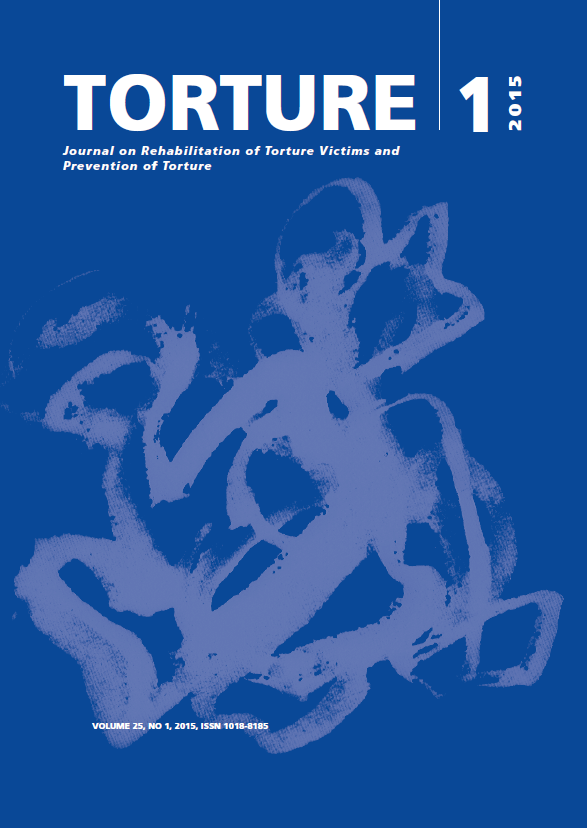The DSM 5 and the Istanbul Protocol: Diagnosis of psychological sequels of torture
DOI:
https://doi.org/10.7146/torture.v25i1.109508Palabras clave:
torture, PTSD, mental health, transcultural assessment, Istanbul Protocol, psychiatric diagnosis, forensic documentation, diagnosisResumen
The Manual on Effective Investigation and Documentation of Torture and Other Cruel, Inhuman or Degrading Treatment or Punishment, commonly known as the Istanbul Protocol, is an interdisciplinary standard supported by, among others, the United Nations and the World Medical Association. It aims at aiding the fight against torture by giving clear guidelines to ensure better and more effective assessment of physical and psychological sequels. Mental health is a key aspect of diagnostical assessment and documentation due to the severe and frequently long-lasting impact of torture that often lasts longer than physical sequels. The inclusion of psychological aspects and a psychiatric diagnosis is to be treated as an important obligatory. Care must be taken to avoid common pitfalls. The new and substantial revisions in the frequently used but also criticised Diagnostical and Statistical Manual (DSM) reflect challenges and opportunities in a comprehensive approach to the documentation of torture.
Citas
2. Perera C, Verghese A. Implementation of Istanbul Protocol for effective documentation of torture - review of Sri Lankan perspectives. J Forensic Leg Med. 2011 Jan;18(1):1-5. PubMed PMID: 21216370.
3. Furtmayr H, Frewer A. Documentation of torture and the Istanbul Protocol: applied medical ethics. Med Health Care Philos. 2010 Aug;13(3):279-86. PubMed PMID: 20419473.
4. Fincanci SK. The role of jurisdiction on persistence of torture in Turkey and public reflections. Torture. 2008;18(1):51-5. PubMed PMID: 19289882.
5. Iacopino V, Ozkalipci O, Schlar C. The Istanbul Protocol: international standards for the effective investigation and documentation of torture and ill treatment. Lancet. 1999 Sep 25;354(9184):1117. PubMed PMID: 10509518.
6. DSM-5 Task Force. Diagnostic and statistical manual of mental disorders: DSM-5. 5th ed. Washington, D.C.: American Psychiatric Association; 2013. xliv, 947 p. p.
7. Mollica RF, Caspi-Yavin Y, Bollini P, Truong T, Tor S, Lavelle J. The Harvard Trauma Questionnaire. Validating a cross-cultural instrument for measuring torture, trauma, and posttraumatic stress disorder in Indochinese refugees. J Nerv Ment Dis. 1992 Feb;180(2):111-6. PubMed PMID: 1737972.
8. Malekzai AS, Niazi JM, Paige SR, Hendricks SE, Fitzpatrick D, Leuschen MP, et al. Modification of CAPS-1 for diagnosis of PTSD in Afghan refugees. J Trauma Stress. 1996 Oct;9(4):891-8. PubMed PMID: 8902755.
9. Blake DD, Weathers FW, Nagy LM, Kaloupek DG, Gusman FD, Charney DS, et al. The development of a Clinician-Administered PTSD Scale. J Trauma Stress. 1995 Jan;8(1):75-90. PubMed PMID: 7712061.
10. Pope KS. Psychological assessment of torture survivors: Essential steps, avoidable errors, and helpful resources. Int J Law Psychiatry. 2012 Sep;35(5-6):418-26. PubMed PMID: 23040707.
11. Wenzel T. Torture. Curr Opin Psychiatry. 2007 Sep;20(5):491-6. PubMed PMID: 17762594.
12. Wenzel T, Griengl H, Stompe T, Mirzaei S, Kieffer W. Psychological disorders in survivors of torture: exhaustion, impairment and depression. Psychopathology. 2000 Nov-Dec;33(6):292-6. PubMed PMID: 11060511.
13. Kalt A, Hossain M, Kiss L, Zimmerman C. Asylum seekers, violence and health: a systematic review of research in high-income host countries. Am J Public Health. 2013 Mar;103(3):e30-42. PubMed PMID: 23327250.
14. McColl H, Higson-Smith C, Gjerding S, Omar MH, Rahman BA, Hamed M, et al. Rehabilitation of torture survivors in five countries: common themes and challenges. Int J Ment Health Syst. 2010 Jun 18;4:16.PubMed PMID: 20565852.
15. World Health Organization. WHO psychiatric disability assessment schedule (WHO/DAS), with a guide to its use. Geneva: World Health Organization; 1988. viii, 88 p. p.
16. den Otter JJ, Smit Y, dela Cruz LB, Ozkalipci O, Oral R. Documentation of torture and cruel, inhuman or degrading treatment of children: A review of existing guidelines and tools. Forensic Sci Int. 2013 Jan 10;224(1-3):27-32. PubMed PMID: 23199437.
17. Keatley E, Ashman T, Im B, Rasmussen A. Selfreported head injury among refugee survivors of torture. J Head Trauma Rehabil. 2013 NovDec;28(6):E8-E13. PubMed PMID: 23348404.
18. Aggarwal NK, Nicasio AV, DeSilva R, Boiler M, Lewis-Fernandez R. Barriers to implementing the DSM-5 cultural formulation interview: a qualitative study. Cult Med Psychiatry. 2013 Sep;37(3):505-33. PubMed PMID: 23836098.
19. Lewis-Fernandez R, Aggarwal NK. Culture and psychiatric diagnosis. Adv Psychosom Med. 2013;33:15-30. PubMed PMID: 23816860.
20. Mezzich JE, Caracci G, Fabrega H, Jr., Kirmayer LJ. Cultural formulation guidelines. Transcult Psychiatry. 2009 Sep;46(3):383-405. PubMed PMID: 19837778.
21. Parsons CD, Wakeley P. Idioms of distress: somatic responses to distress in everyday life. Cult Med Psychiatry. 1991 Mar;15(1):111-32. PubMed PMID: 2060312.
22. Nichter M. Idioms of distress: alternatives in the expression of psychosocial distress: a case study from South India. Cult Med Psychiatry. 1981 Dec;5(4):379-408. PubMed PMID: 7326955.
23. Prophet S. V codes: supplementary classification of factors influencing health status and contact with health services. J AHIMA. 1996 Jun;67(6):16-8, 20, 22; quiz 4-5. PubMed PMID: 10157903.
Descargas
Publicado
Cómo citar
Número
Sección
Licencia
We accept that some authors (e.g. government employees in some countries) are unable to transfer copyright. The Creative Commons Licence Attribution-NonCommercial-NoDerivatives 4.0 International (CC BY-NC-ND 4.0) covers both the Torture Journal and the IRCT web site. The publisher will not put any limitation on the personal freedom of the author to use material contained in the paper in other works which may be published, provided that acknowledgement is made to the original place of publication.


